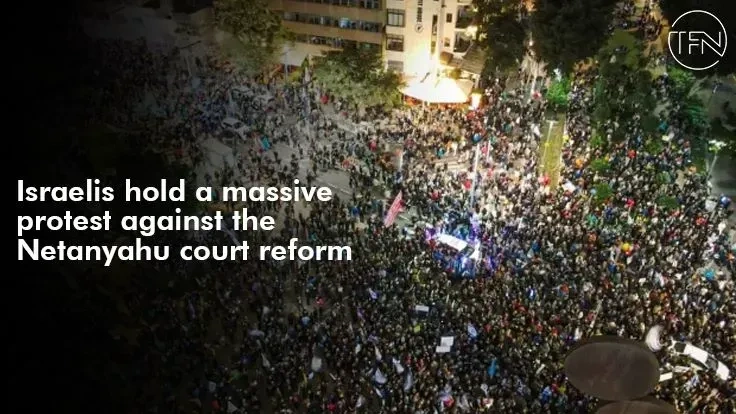
An estimated 110,000 people crowded Tel Aviv's streets in one of the biggest anti-government protests the country has witnessed in the previous ten years.
Protests broke out throughout the city center with banners calling for an end to the government coalition, which is the most religious-nationalist in Israel's history.
"This is a risky government," said Yaara Ben Geraluf, a teacher from the western seaside district of Jaffa.
According to her, "This government will not be any good for women, LGBTQ people, the poor, and obviously for Palestinians."
The organizers claim that they are working to prevent a "coup" against the democratic system.
For the second week in a row, there have been sizable protests in four different cities.
According to opposition leader Yair Lapid, those who love the country came to Tel Aviv to defend its democracy and judicial system.
"We won't give up until we succeed," he said.
It takes place three weeks after Israel's first stable administration in three years, Benjamin Netanyahu's reelection as prime minister was announced. He said that Israeli voters chose security and this government.
His coalition comprises groups including one whose leader has a history of harboring prejudices towards Arab people and another whose outright homophobia and sexism are on display.
Protesters accuse Mr. Netanyahu of undermining democratic governance amid an unusual dispute between the new government and Israel's courts.
The coalition's suggested modifications would give it the authority to act instead of any future law that the courts decide to invalidate. Opponents claim that Israel's democratic system of checks and balances is in jeopardy.
Furthermore, detractors claim that Mr. Netanyahu, who is being investigated for corruption, is seeking to influence the judges to avoid going to jail.
The opinions of a coalition of parties that openly supports racism, homophobia, and anti-Palestinian feeling are also passionately opposed by many protesters.
When the government took office, it declared "exclusive" Jewish sovereignty over "all sections" of the land, which includes the occupied Palestinian areas.
Tal Meidan, a Tel Aviv interior designer, displayed a poster showing Benjamin Netanyahu and his two ultranationalist followers as "the cats trying to take the milk."
Holding her young son Michael, she said, "I feel what they are doing is morally and ethically wrong."
"I'm trying not to cry since we made a lot of sacrifices to come to this country. I don't want my children to join the military right now," she said.
"I want my four children to live in a new country, one where I, Arabs, and homosexuals are all treated equally. If not, we, unfortunately, cannot see raising children here," she said.
The protest organizations are not united.
Many people focus their opposition on what they perceive to be an unprecedented attack on the legal system, while others concentrate on what they perceive to be an attack on Israel's secular life, given that the coalition is made up of parties that strictly adhere to religious observance.
During the protests, some protestors seemed to be the minority while others centered their cause on Israel's occupation of the Palestinian Territories. The BBC recorded a minor scuffle that occurred when one protester objected to others waving Palestinian flags.
Mr. Netanyahu condemns the protests and claims that those who participate are disobeying the will of the people.
"Two months ago, there was a huge protest—the mother of all protests. Millions of people flooded the streets to cast their ballots in the elections. The previous week," he said.
One of the main concerns for voters was legal system reform.
"I must acknowledge that we did not promote civil war or bring up the breakdown of the state while we were in the opposition," he said. "I expect the leadership of the opposition to act similarly."
The protests reignite old divisions in Israel between liberals and nationalists, the religiously devout and the secular.
While the protesters have clogged Tel Aviv's streets, they have traditionally been underrepresented in Israel as a whole. Israelis have swung to the right, according to polls.
Benjamin Netanyahu has become more reliant on the most extreme groups within Israel's religious-nationalist movement as once-loyal followers have turned against him.
Since he is facing a corruption prosecution, he is maybe in his weakest position as prime minister right now.

